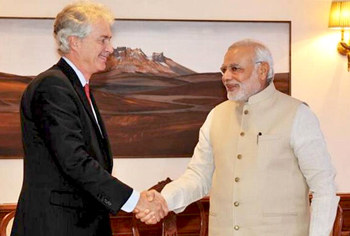 Washington, Jul 12: A move to invite Indian Prime Minister Narendra Modi to address a joint session of US Congress is gaining momentum with 36 lawmakers endorsing it in a letter to the Congressional leadership.
Washington, Jul 12: A move to invite Indian Prime Minister Narendra Modi to address a joint session of US Congress is gaining momentum with 36 lawmakers endorsing it in a letter to the Congressional leadership.
Brad Sherman, a senior Democrat on the House Foreign Affairs Committee and an active member of the Congressional Caucus on India and Indian-Americans, is spearheading the effort along with Republican Ted Poe and Democrat Eni Faleomavaega.
Modi, who has been invited by President Barack Obama to visit Washington, is expected to meet him at the White House on Sep 30 after addressing the UN General Assembly session in New York.
An invitation to address a Joint Session of Congress is viewed as the highest honour the Congress can bestow on a foreign head of state, said Sherman.
Noting that in each of the last three decades, a Prime Minister of India has addressed a joint session of Congress, the lawmakers said Modi's upcoming visit "will allow us to continue that tradition."
Modi's three predecessors Rajiv Gandhi, Atal Bihari Vajpayee and Manmohan Singh have all been accorded this honour.
"I am pleased that many more members have joined the effort to invite Prime Minister Modi to a Joint Session of Congress," Sherman said.
"The United States and India have a special relationship based on shared democratic values. This is an excellent opportunity to build on this partnership."
The letter addressed to Speaker John Boehner, Democratic minority leader Nancy Pelosi and Senate majority and minority leaders is being circulated throughout the House of Representatives for getting more signatories.
"Given the importance of our relationship with India, we ask you to invite Prime Minister Modi to address a Joint Session of Congress," the letter says noting "India recently held the largest democratic exercise in history."
"Since recognizing India's independence in 1947, the United States and India's relationship has steadily grown," it said.
"The United States and India share many core values, including religious pluralism, individual freedom, the rule of law, and electoral democracy," the letter said.
"We have an opportunity to build on the US-India strategic partnership to the benefit of both our nations," the lawmakers wrote.
"India is a growing economic power in a strategically important region of the world. New Delhi plays a critical role in regional peace and security," they added.
Meanwhile, a couple of Indian-American groups are campaigning hard to win more lawmakers' support for the move to invite Modi to address a joint session of US Congress.
The Speaker's office has not yet announced a response to the lawmakers' letter, but an
invitation to Modi is considered highly likely given how US leaders from Obama down have reached out to the Indian leader since his resounding victory.






Comments
Add new comment